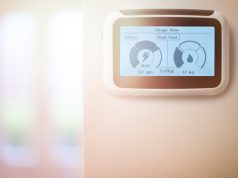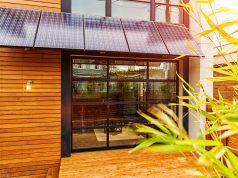There are a lot of benefits to being eco-friendly, from looking after the planet to saving money. It may seem complicated, but there are so many simple things you can do to make your more home eco-friendly.
Controlling the temperature of your home
There are several ways to control the temperature of your home. One is to install internal shutters. These prevent heat from escaping your home to keep you warmer in the winter, which means that you’ll need less heating. The shutters also keep out heat, so you’ll use less energy on air conditioning during the summer months, providing you with savings for your pocket and the planet, all year round.
You can also keep heat from escaping by using insulation, or you can use solar panels to reduce your energy bill. However, these are more costly, and although you may save the money spent on these eventually, internal shutters are the cheaper option and come in a range of styles to suit your home.
Switch to energy-efficient appliances
When the time comes to replace larger appliances such as your oven or washing machine, it’s worth considering an energy-efficient model. These may cost a little more than your last appliance, but over time they can save you money. Just by replacing your washing machine, tumble dryer and fridge freezer with more efficient models, you could save £275 a year.
On a smaller scale, you can switch to energy-efficient lightbulbs, which also last longer than regular lightbulbs.
Learn to fix things
Although you may sometimes need to replace things, especially faulty electrical items, you can learn how to repair non-electrical items around the home. This can save you money and remove the need to purchase more items and create more rubbish. You may also discover a new hobby and be able to use materials you already own to make things to spruce up your home and add your own unique style.
Turn it off
If you’re not using something, turn it off. If a laptop or television is on standby, make sure that it’s switched off. These devices don’t tend to take a lot of time to switch back on again. Most laptops tend to power up within a couple of minutes. Is it really worth wasting electricity to save such a small amount of time? The money you save may not be much, but it all adds up.
There are lots of small ways to save electricity around the home. Instead of having phones and other devices constantly charging, unplug them when they are full, and don’t leave chargers switched on while no device is attached. You can also use lights less often, if there is already sufficient daylight or if nobody is in the room. People often have the television switched on as background noise when nobody is watching. You could try switching it off after you’ve finished watching something.
You could also try saving on your heating usage. If you’re only feeling the cold a little and don’t have anyone else living with you, try putting on a jumper instead of switching on the heating. You may find that you spend most of the day in one room, in which case you could try turning off the heat in other rooms. Try warming up your bedroom just an hour before bedtime instead of keeping rooms warm all day when nobody is in them much or at all.
Recycling
Most households have paper and cardboard recycling bins, and many households struggle to cut down on rubbish as local councils are keen to reduce the number of collections or general waste bins made available. It therefore makes sense to put the recycling bins to use to dispose of all paper and cardboard. It frees up space in the main bin while helping you to be eco-friendly. Also try to use recycled products whenever possible.
Use less water
You can use less water by washing clothes on a shorter cycle and having baths instead of showers – and when you do shower, use low-flow shower heads. These can use 28% less water than regular shower heads.
Grow your own food
If you have a garden, growing your own food is a great way to cut down on your eco-footprint. Even if you don’t have a garden, you can use windowsill boxes inside your home. This will also improve your air quality as well as saving you time and money on going out to buy herbs or vegetables.
These are just some of the many ways that you can be more eco-friendly at home.














